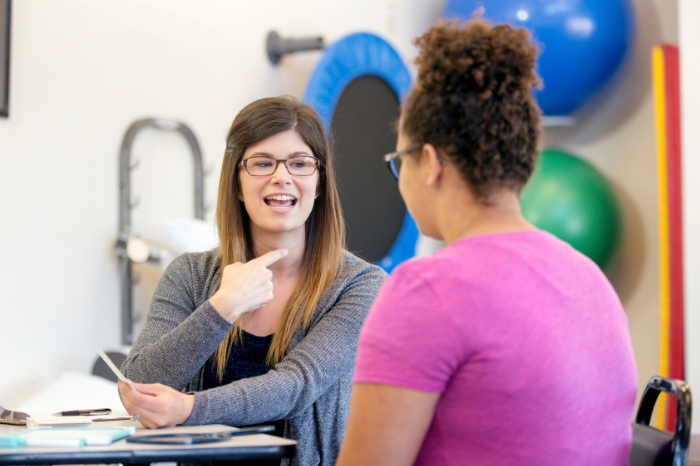
You’ve got the passion. You’ve got the experience. And you’ve got the vision. So how do you take it all to start or expand your National Disability Insurance Scheme (NDIS) business?
Whether you’re a therapist looking to start working for yourself, or a sole operator wanting to expand and bring on your first team members, taking informed, intentional and planned action before you branch out means you can build your business in a way that works best for your clients and rewards you as well.
So, let’s get started!
Peter Flynn is the Business Development Manager of Clinic Mastery, which exists to help allied health professionals grow their businesses. Importantly, Peter says it’s about working for the right reasons.
“We help other clinic owners to grow their clinics sustainably and we do it from an ethical standpoint that creates an amazing workplace where people want to work – so the business owner wants to be there, the team wants to be there, the clients love it, and the clinic does good in the community,” says Peter. “It’s about trying to find the balance between all of those.”
And everyone at Clinic Mastery can walk the talk, being former health business owners themselves. However, Peter says there’s a big difference between being a good health care provider and being a good business owner.
“My background is in physiotherapy. I studied exercise science and then a Masters in Physiotherapy, and I sold my two clinics in December 2022. I found my degrees didn’t touch on business at all – in fact, physiotherapy doesn’t even touch much on private practice, it’s geared towards hospital or aged care,” he says.
“You can be a really good practitioner, but the thing you find out quickly is being a good practitioner has zero correlation to being a good business owner. It’s a whole different skill set.”
Meanwhile, Anna Crump from Blue Iris, which specialises in support coordination and in-home support for people with psychosocial disability, says she’s witnessed business growth exploding in a very short time.
“There is enough work for everyone, and we celebrate collaboration over competition with other agencies, but there has been an explosion of support providers in south-east Queensland,” says Anna. “In northern areas of Queensland, from Sunshine Coast to north Queensland, there is a real lack of quality service providers, and it’s really hard to get services in remote areas.”
She says some business owners can be inspired to start quickly, without realising what they need to do to provide a safe, quality service.
“The NDIS is a multi-billion-dollar industry, so people will generally do stuff because they think they can, not realising what they need to put in place to do it well,” says Anna. “Having relationships with other providers in the sector is important.”
This seems obvious, but it’s so important and often overlooked – why are you going into business for yourself? What can you offer to your potential clients that will benefit them and you? And what’s the environment in which you’ll be operating?
Anna says it’s this initial planning which is vital.
“You have to find a niche and the best sort of service you would provide,” Anna says.
“You have to have a really robust business plan before you even take on clients. Know what the NDIS Quality & Safeguards Commission expects – there’s a lot on their website for you to learn about. Go into it knowing you won’t be the right provider for everyone and go into it to provide the best service. It’s not just about making money.
“Remember there should be a lot of safeguards in place because you are providing support to the most vulnerable in our society. There should be a lot of hoops to jump through, it is a really important role.”
Peter says it’s important to interrogate why starting your own business is your driving force.
“If what you want to do is aligned with working in employment, then keep doing it, because you can progress in your role quite far,” says Peter. “We sometimes think the only way is to start a business, but you do have to enjoy being in business, because it’s going to take a lot of time.”
“If you’re not feeling fulfilled in the role you’re currently in, have you had a chat with your boss? Is there a way to find more fulfilment in your current role?
“If there is a lot of uncertainty in your life it’s not a good time to start, because starting your own business never goes as smoothly as we would like.
“But, if you have all your ducks in a row and you have the drive and the desire to expand your creative flair, you want to increase your earning capacity and the capacity for freedom that owning your own business can create, then it’s worth looking at.”
Anna agrees and says there are clear pathways to promotion within Blue Iris.
“When we employ our support workers, we show that there are opportunities for career growth in the agency. We have support workers, senior support workers, team leaders and support managers, and a lot of our senior people came from starting as support workers,” says Anna.
“Look for progression before going out on your own. A lot of people think it’s going to be easier, but from a compliance and risk point of view, there’s a lot more than what you think.”
Peter and Anna agree that it’s a lack of understanding around policies, contracts and position descriptions that can trip up new business owners. Knowing what to prioritise – and what to spend – is vital.
Peter says that a good accountant is worth their weight in gold – someone who knows how to do payroll, account for tax, pay superannuation on time, and educate owners on good financial practices.
And Anna says understanding both the federal and state legislation where you operate is important.
Peter says this is another milestone event, but if you can’t fulfil your clients’ needs on your own, it’s a step you’ll have to consider if you want to grow and expand.
“It takes a lot of courage,” he says. “It’s really scary when you hire your first person, you’re taking on risk whenever you increase your overheads.”
“Whilst it’s easy now to say, ‘just hire your first person’, when we hired our first admin or therapist it was scary as hell. The other things it takes are a plan, and understanding when is the right moment to hire, who is the right person, and how does it fit into the overall business plan.”
Getting feedback from others can help ensure you’re hiring the person who’s going to align with your business, he adds.
Anna agrees that expert advice and feedback is key.
“I would recommend finding a mentor, linking yourself with amazing providers through networking, and attending sector events,” she says. “Find mentors in the sector who have high standards and are compliant, not by their own account but by the people receiving the service.”
“Take feedback, good and bad, and apply it, noting that you won’t get it right all the time and that you won’t be right for everyone.”
Anna says regular training for all team members has to be a priority.
“You need ongoing staff training, not just an induction period,” says Anna. “It’s about fostering the skills for your workplace and providing that ongoing training to get a quality service.”
And while professional development is compulsory for some allied health professionals, business owners should never stop working on their own learning and that of their business. This is especially true for clinicians making the transition to their own small business, where they lose the regular feedback from colleagues that’s part and parcel of working for a large organisation.
But that doesn’t have to be formal training or attending conferences and seminars. Peter sourced his own coaches and mentors – therapists who had treated him for injury.
“I decided I was going to hire three mentors to help me clinically. They were just people I’d seen as a patient, or people I looked up to. I simply said, ‘I love what you do, what would it cost for 30 minutes of your time to go over case studies?’ and everyone was very keen,” he says.
“I know a lot of younger clinic owners who create a circle of their professional friends on WhatsApp and do their own case studies between them – there are different ways to make it happen.”
It comes down to making sure you’re serving your clients and serving yourself – so everyone wins.
Anna is forthright when she says sometimes new business owners may not be in the disability sector for the right reasons.
“People with disability are not cash cows. You need to commit to person centred practice that is unique to each participant,” she says.
“The other thing is, just because a participant has specific funding doesn’t mean you have to use it all. If you have a client who is funded for 12 hours a day of support, but you notice they only need eight hours of support, communicate that. You can offer capacity building with the extra hours or keep some for other stuff they might like to do.”
Peter says clinic owners need to ensure that they respect their own working time in the way they would respect their patient’s time.
“For some business owners, when they are working as a practitioner, their time management is fantastic, they’re focused entirely on the client. But when they’re working as a business owner, they can’t organise and prioritise time as well. The same respect and attention you give to the client you need to give to your business,” he says.
Making the switch from practitioner to clinic owner also requires a mindset shift, Peter adds.
“You need to understand that your role changes from supporting your clients to also supporting and helping your team,” he says.
“Working as a clinician, you are one to one, you see the results in front of you, with happy people and making a genuine difference. But, as an owner, it often becomes about dealing with team members who need support to work through challenges, unhappy clients who want to speak to you etc.
“But it helps to remember: as a physio I could help maybe 60 people. As a clinic owner, with my team as an extension of me, we could help potentially thousands of people.”


